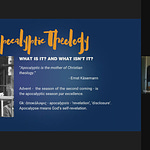Luke 24:36-49
The question at the heart of this passage is,
who and what is the real Jesus?
This is a question we should always be asking ourselves. Who is this man? What is He? Because we are forever tempted to confuse the Real, Holy, Crucified, Risen, and Ascended Jesus, the Jesus who is nothing less than God Himself, with the Jesus of our invention, the Jesus made in our image, the Jesus who is no more than an idol crafted from our bias and prejudice.
As Christians we must always be discerning about who the real Jesus is, and who is the Jesus of our own invention.
Because this stuff really matters. What you think about Jesus, is what you think about God, which is ultimately what you think about life and how you live. If you think that Jesus was just a good teacher relegated to history, then the God that Jesus is, is irrelevant and not really worthy of our worship, and you will live a life devoid of the fullness God intends for it. Or if you think that Jesus is the victim of a wrathful God hell-bent on destroying sinners, then you are more likely to live a judgemental, retributive, and violent life devoid of grace and forgiveness. You’re more likely to declare war in Jesus’ name. But if you think that Jesus is God, coming with words of peace, and love, and forgiveness, and grace already on His lips, if you think that Jesus is God doing for us what we cannot do for ourselves, if you think that Jesus is God loving us even to death, and restoring sinners, then you will live a life shaped by grace and humility and love. It really matters that we get this right, because we so often do not get it right, we so often misunderstand, we so often fail to recognise the real Jesus, instead preferring the Jesus of our own invention.
So, we’ve come to the end of Luke’s Gospel. Luke concludes his account of the Good News about Jesus with another story of the risen Jesus appearing to His disciples. Contrary to the other three Gospels, where Jesus first appears to the women at the tomb, in Luke’s Gospel the women at the tomb are only met with Angels, they do not actually see Jesus. Luke, who is trying to write a more forensic version of the events, is perhaps a little more reticent – given that he was writing in a patriarchal society where a women’s testimony was not considered valid – to pin the first resurrection sighting on what was considered an “unreliable” source. But Luke also doesn’t pin the first resurrection sighting on a more obvious choice like Simon Peter – one of Jesus’ closest friends – who also only sees the empty tomb and not Jesus Himself (although as per verse 34 Luke isn’t entirely consistent on this). According to Luke, the risen Jesus first chooses to appear to none other than these two unknown and obscure Emmaus-bound runaways – Cleopas and his unnamed companion – who are fleeing from the scene of the crime with their tails between their legs.
A consistent thread throughout the Gospels – and indeed a consistent thread for much of the church even to this day – is the inability of Jesus’ disciples to recognise who He is, and to misunderstand what He is about. They misunderstood Him during His ministry. They misunderstood Him at His death. And it appears that they misunderstand Him at His resurrection. They do not recognise Him; they are blinded by their unbelief. Not until He breaks bread, reenacting the events of Good Friday at the dinner table, are their eyes opened and the penny begins to drop. But before they could enquire further, He vanishes – just like that.
Something we learn about the real Jesus from today’s passage and the previous account on the road to Emmaus, is that the risen Jesus is something of an odd bod – literally an odd body – a body capable of vanishing and appearing at will. As Jesus once said to the Pharisee Nicodemus, “the wind blows where it wills.” Jesus’s resurrected body behaves, oddly, it behaves spiritually. It is an odd body; a body which “doesn’t play by the normal rules.”
So, Cleopas and his companion run back to Jerusalem to find the other disciples (not simply the 11 but a whole rabble of Jesus’ former followers) in hiding. They declare “The LORD has risen indeed!” before we get to our verses for today.
Our text today begins with this line, “While they were still talking about this…” I like to try and imagine what the discussion was like. I suspect it might have gone something like this:
“Well, the women who came from the tomb are all just hysterical with grief. Simon Peter too – in wake of his denial – seems to have lost the plot. And now we have these two runaways who are saying they’ve actually seen Him – how can we trust any of their testimony? We had better shut them up before word gets out and we all meet the same fate as our former Rabbi, crucified for blasphemy against God and treason against the emperor.”
But, lo and behold, before they can go any further the odd bod arrives. “Jesus himself stood among them…” Luke says. Giving not a seconds thought about using the door, the risen Jesus – the odd body – just as quickly as he vanished from the road to Emmaus, appears to this crowd of twitchy disciples, and His words to them are…
Flee! run for your lives you treacherous bunch,
you who would deny and betray me,
you who would abandon me to death,
you who called me friend and Rabbi but fled at the first sign of danger and didn’t heed anything I taught you,
you who turned your back on me resolute in your unbelief,
you who were too busy saving your own skins to worry about mine being torn to pieces and pierced,
prepare to meet your doom and suffer my vengeance for your cowardice and betrayal.
The risen Jesus has every right to be incensed at his friend’s lack of faith. The risen Jesus has every right to come storming into that room with hellfire and brimstone and smite them where they stand. The risen Jesus has every right to abandon them, to leave them in their fear, to cast them into the depths of the Hell he Himself has just faced. But that is not the real Jesus, that is the Jesus of our invention, that’s what Jesus made in our image would do.
But no. The real Jesus – the one in whose image we are made – doesn’t come with words of retributive violence on His lips. The real Jesus instead greets them with the words, “Peace be with you!” (Any liturgically minded people here will need to resist saying "and also with you.")
Unlike Cleopas and his companion, the disciples here do get one thing right, they instantly recognise Him as the same one who just three days ago was a limp corpse pinned to a tree. But, just like the Runaways they still fail to understand him, to see Him as he really is. Instead of heeding his words of peace, instead of actually taking Him at His word, they are terrified, they are mortally afraid, they are anything but peaceful running around like headless chickens. They are blinded by fear and terror as though Jesus were an embittered and vengeful poltergeist come to torment punish them for their treachery. Because that's what we would do. They confuse how they would have reacted to being betrayed by their closest friends with how the real Jesus should react. They fail to recognise Jesus as he truly is, and still think of him how as they think he should be – which in this case is dead. No one could come back from what happened three days previous. This is why Jesus shows them the wounds of crucifixion, not only to prove that it really is him, but also to prove that Good Friday really did happen. He really did die. He really has been through death and He really has emerged victorious. Jesus is not like Lazarus who was merely resuscitated. At some point Lazarus would die again. The risen Jesus is not merely resuscitated, he is resurrected. He is somehow both continuous with the Jesus who died on the Cross, and is yet surpassingly different… odd… glorified through death.
J.R.R. Tolkien gets at this when Gandalf the Grey plummets to His death in the Mines of Moria whilst fighting a Balrog – a fiery demon of the first Dark Lord Morgoth – only for Gandalf, the very same Gandalf to reappear on the other side of death as Gandalf the White… the same person and yet somehow new. But despite the newness, still the same person.
The Bible suggests that everyone will be resurrected at the end of this world for judgement. I was having a conversation with someone about this recently discussing “the final judgement” and that fateful day when Jesus will return. My friend essentially argued that Jesus is the kind of gracious, forgiving, kind, loving, gentle, humble, generous, faithful, merciful – all the kinds of virtues we like – He is this kind of Jesus up until He returns, “But when He comes back, boy oh boy, are those sinners going to get it!” And that makes sense to us. Because we think judgement and justice means bad people getting what they deserve right? At least, if we were the final judge that’s what it might look like.
But that’s not the real Jesus. If we truly believe that Jesus is God, that Jesus is the second person of the Trinity, and if we believe that God does not change, then the Jesus who we will meet at that final future, at the end of all things, will be no different from the Jesus who says to the rotten traitorous sinners that are his disciples, “Peace be with you…” Not only is Jesus’ resurrected body odd, but his words are odd too. As the author of Hebrews put it, “Jesus Christ is the same yesterday, today, and forever.” The real risen Christ, the odd bod, is not suddenly going to become some vengeful retributive God who punishes sinners at the final Judgement. God does not change. After all, Jesus already is God’s judgement. The Crucified and Risen Christ is God’s judgement upon the world. When God comes to judge the world he doesn’t punish it, he dies for it, he does not exact his vengeance upon evildoers, he restores them. God’s judgement is restorative, not retributive. That’s doesn’t mean it won’t hurt. It will hurt like fire, it will hurt like it does when you come to the realisation that you have let down a doting parent. It will hurt like it does when you know you have wronged someone who loves you deeply. It will hurt like when you have to go to that person who gave the most amazing gift and you say, “I squandered it.” God’s restorative judgement may hurt, but it’s still restoration nonetheless; it is not retribution. Again, what you think about God, really matters, if God is retributive then we have licence to be retributive. But if God is restorative, then we have a much harder but wholly better road ahead laid out for us.
And notice in this passage that Jesus doesn’t even get His disciples to beg for forgiveness. He has every right to, but he doesn’t. He doesn’t say to the Disciples, “Get on your knees and beg for my forgiveness and I might consider taking you back under my wing…” For the real Jesus is not only God’s judgement, the real Jesus is also God’s forgiveness and grace. As Robert Farrar Capon put it,
He forgave you before you repented. That’s crucial. See, that is why it is so outrageous. The gospel is really vulgar, crass and immoral because it says God forgives the world before it repents. In the gospel, repent is always repent and believe. It means turn yourself around from not trusting the forgiveness and trust it. That’s it. It doesn’t mean that you earn it by repenting. You had it before.
The Jesus of our invention would make us earn everything. The Jesus of our invention turns grace into a law, a contract, or a bargain with God to merit forgiveness. The Jesus of our invention sees God as fundamentally angry and wrathful towards us. The Jesus of our invention effectively separates Jesus from the trinity and makes out as though God is the bad cop, and Jesus is the good cop – that God would destroy us if it weren’t for Jesus’ intervention. The real Jesus however, the one who is God, and is God’s judgement, is the one who comes with peace, and grace, and forgiveness on his lips, the real Jesus, the one who is God, is the one who spends his time in the company of sinners, and betrayers, and deniers, and runaways, loving them back to life – this same Jesus is the final judge.
Hear the Good News about Jesus: we’re all going to die. And if we’re truly honest with ourselves, we don’t really know what happens when we die. The Bible is ambiguous at best on this. But we do know who happens when we die, Jesus happens. The real Jesus. That’s why He says to His disciples, “Why are you frightened?” In His presence there is nothing to be afraid of, not even death. As the Psalmist says, “Yea, though I walk through the valley of the shadow of death, I will fear no evil: for thou art with me, thy rod and thy staff they comfort me.” (Psalm 23:4 KJV). The God of resurrection does not promise to keep us from death. Quite the opposite. The God of resurrection leads us into the valley of death, but we can proclaim “I will not fear, for the conqueror of death is with me, His rod and staff, they comfort me.” Jesus doesn’t mean something else when He says, “Peace be with you!” He doesn’t offer you a gift only to then bite your hand off later on as the Jesus of our invention would do. You can take the real Jesus at His word, “Peace be with you.”


















Take Him at His Word